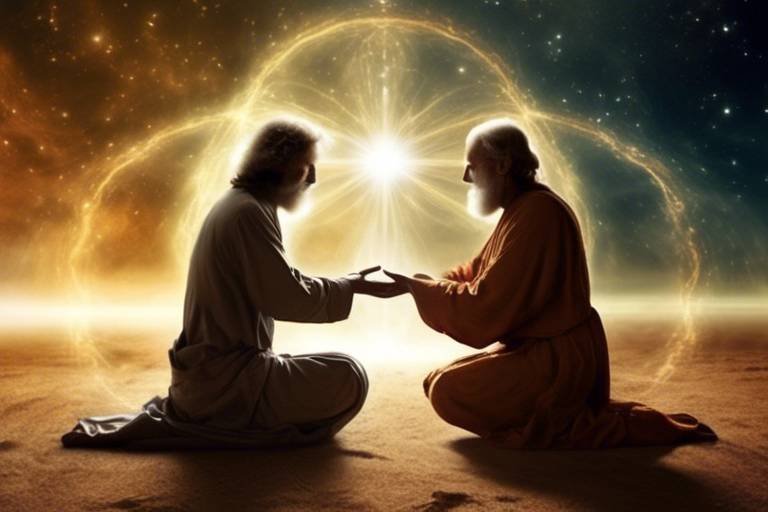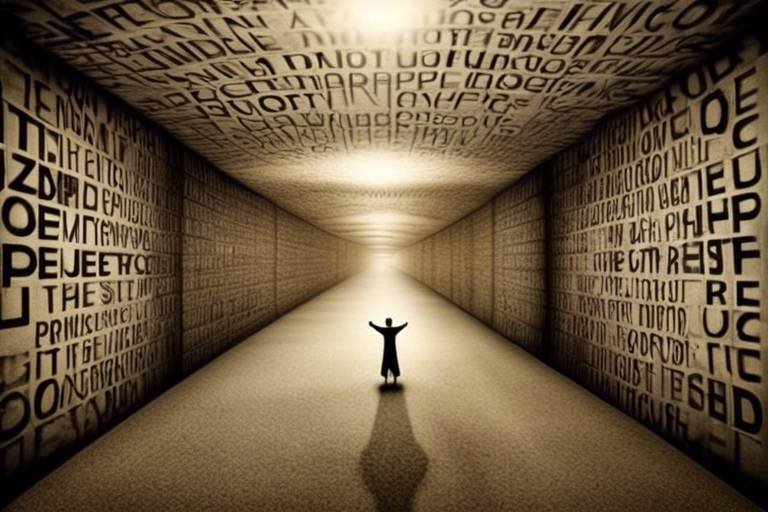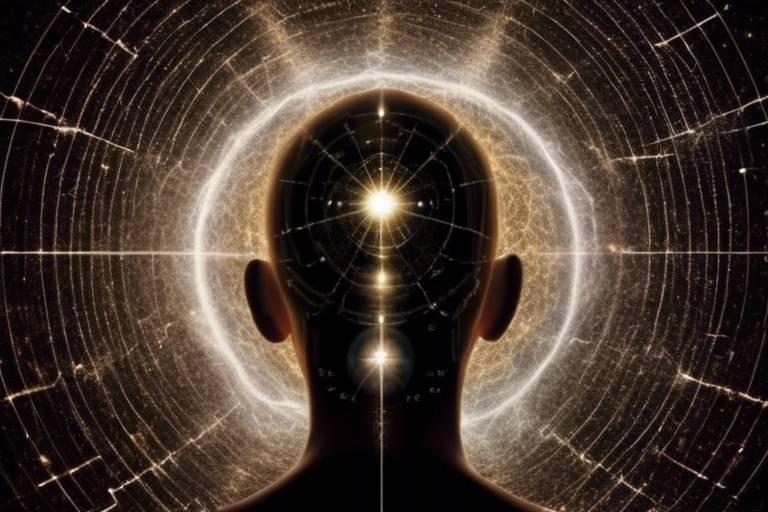Metaphysics and Spirituality - An Inseparable Bond
The connection between metaphysics and spirituality is as profound as the universe itself. Imagine standing at the edge of a vast ocean, where the horizon meets the sky—a place where the known and unknown collide. This is where metaphysics and spirituality coexist, each enriching the other in ways that shape our understanding of existence, consciousness, and the universe. Metaphysics invites us to ponder the fundamental questions of reality: What is being? What does it mean to exist? These inquiries serve as the backbone of spiritual exploration, guiding us through our personal quests for meaning and connection to something greater than ourselves.
As we delve into these intricate layers, we discover that metaphysics is not just a collection of abstract concepts but a philosophical foundation that lays the groundwork for spiritual inquiry. It provides us with a framework to explore our beliefs, experiences, and the very essence of life. Spirituality, on the other hand, is a deeply personal journey that often intertwines with metaphysical principles, shaping our understanding of the self and the cosmos. This intertwining creates a tapestry of beliefs and practices that resonate with our inner selves, allowing us to navigate the complexities of existence with greater clarity.
Throughout history, cultures around the world have approached these disciplines in unique ways, each adding its own flavor to the conversation. From the ancient philosophies of the East to the rational inquiries of the West, the exploration of metaphysics and spirituality has evolved, yet the core questions remain timeless. This article aims to unravel these connections, revealing how they inform our understanding of reality and our place within it. So, let’s embark on this journey together, exploring the depths of metaphysics and spirituality and uncovering the inseparable bond that ties them.
- What is the difference between metaphysics and spirituality?
Metaphysics is a branch of philosophy that examines the fundamental nature of reality, while spirituality is a personal quest for meaning and connection to something greater.
- How do metaphysical practices enhance spiritual experiences?
Practices such as meditation and energy healing incorporate metaphysical principles, allowing individuals to connect with deeper aspects of reality and consciousness.
- Can science and spirituality coexist?
Yes, the relationship between science and spirituality is increasingly relevant, as both fields seek to understand the nature of reality and our existence within it.

The Foundations of Metaphysics
Metaphysics serves as the philosophical backbone for understanding the intricate tapestry of reality. It is not merely a dry academic discipline; rather, it is a profound inquiry into the very essence of existence. At its core, metaphysics grapples with fundamental questions about being, existence, and the nature of the universe. Think of it as the lens through which we can explore the unseen forces that shape our lives and the world around us.
To delve deeper, metaphysics can be broken down into several key areas of inquiry that are essential for spiritual exploration:
- Ontology: This branch focuses on the nature of being and existence. It asks questions like, "What does it mean to exist?" and "What is the nature of reality?"
- Cosmology: This area examines the origins and structure of the universe. It connects deeply with spiritual beliefs about creation and the cosmos.
- Epistemology: This branch looks at the nature of knowledge and understanding. It questions how we come to know what we know, bridging the gap between metaphysical concepts and human experience.
By exploring these areas, we begin to see how metaphysics provides a framework for spiritual inquiry. It invites us to ponder questions that resonate with our inner selves, encouraging us to seek answers that go beyond the material world. For instance, when we ask, "What is consciousness?" we are not just engaging in a philosophical debate; we are embarking on a spiritual journey that can lead to profound insights about our place in the universe.
Moreover, metaphysics challenges us to reconsider the nature of reality itself. Is the universe a random collection of particles, or is there a deeper order and purpose behind it all? This inquiry leads us to explore concepts like the interconnectedness of all things, which is a common theme in many spiritual traditions. Just as a spider weaves a web, metaphysics helps us understand how everything in existence is intricately connected, forming a unified whole.
In summary, the foundations of metaphysics are not just abstract theories; they are vital components of our quest for understanding. They encourage us to ask the big questions and seek deeper truths about ourselves and the universe. As we navigate through life, these metaphysical inquiries can guide us, offering insights that resonate with our spiritual journeys.

The Role of Spirituality
Spirituality is more than just a buzzword; it's a deeply personal journey that many embark upon in search of meaning and connection to something greater than themselves. It acts as a compass, guiding individuals through the often turbulent waters of existence. Imagine standing on the shore of a vast ocean, feeling the waves of life crashing around you. Spirituality is like the lighthouse that helps you navigate through the fog, providing clarity and direction. But how does it intertwine with metaphysical principles?
At its core, spirituality often intersects with metaphysical concepts, shaping our beliefs about the self and the cosmos. It invites us to ponder profound questions such as: Who am I?, What is my purpose?, and What is the nature of reality? These inquiries are not merely academic; they resonate on a personal level, urging us to explore our inner landscapes and the universe beyond. Spirituality encourages us to look beyond the physical realm and consider the unseen forces at play, much like an artist who sees beyond the canvas to envision the masterpiece that could be.
Moreover, spirituality often manifests through various practices and rituals that connect individuals to the metaphysical realm. These can include:
- Meditation: A practice that allows individuals to quiet the mind and tap into a deeper state of consciousness.
- Prayer: A means of communicating with the divine, seeking guidance, and fostering a sense of connection.
- Rituals: Activities that symbolize deeper meanings and create a sense of community.
These practices serve as bridges between the tangible world and the metaphysical, allowing individuals to experience a sense of unity with all that exists. Just as a musician feels the rhythm of a song, spirituality invites us to dance with the universe, recognizing that we are part of a larger symphony of existence.
In a world that often feels chaotic and disconnected, spirituality offers a sense of belonging. It reminds us that we are not alone; we are part of a vast tapestry woven together by shared experiences, emotions, and aspirations. This interconnectedness is a fundamental aspect of both spirituality and metaphysics, as they both seek to understand the nature of existence and our place within it.
Ultimately, the role of spirituality is to enrich our lives, providing depth and meaning in ways that transcend the physical. It invites us to explore the mysteries of the universe and our own consciousness, fostering a sense of wonder and curiosity. As we delve deeper into our spiritual journeys, we find that the lines between metaphysics and spirituality blur, revealing an inseparable bond that shapes our understanding of existence.
What is the difference between spirituality and religion?
Spirituality is a personal quest for meaning and connection, while religion often involves organized beliefs and practices shared by a community.
Can spirituality exist without metaphysics?
While spirituality can be experienced independently, many spiritual beliefs are inherently tied to metaphysical concepts, exploring the nature of reality and existence.
How can I begin my spiritual journey?
Start by exploring practices such as meditation, journaling, or connecting with nature. Reflect on your beliefs and what gives your life meaning.

Historical Perspectives
Throughout the ages, the realms of metaphysics and spirituality have danced together in a complex interplay, influencing how humanity perceives existence and the universe. Various cultures have approached these concepts with unique lenses, creating a rich tapestry of thought that continues to shape contemporary beliefs. From the ancient philosophers of the West to the spiritual sages of the East, each perspective offers profound insights that illuminate the inseparable bond between metaphysics and spirituality.
In ancient Greece, philosophers like Plato and Aristotle laid the groundwork for metaphysical thought. Plato's theory of forms suggested that the material world is but a shadow of a higher reality, a concept that resonates deeply with spiritual seekers who yearn for a greater understanding of existence. His student, Aristotle, took a more empirical approach, yet both thinkers grappled with questions of being and existence that still echo in modern spiritual practices.
On the other side of the world, Eastern philosophies offered a different narrative. In Buddhism, the concept of emptiness (śūnyatā) challenges the notion of a permanent self, promoting the idea that understanding the nature of reality involves transcending the ego. Similarly, Hinduism introduces the idea of karma and the cycle of reincarnation, which emphasizes the interconnectedness of all beings and the spiritual journey toward enlightenment. These philosophies not only explore metaphysical questions but also provide practical spiritual frameworks for personal growth.
The Middle Ages saw a fusion of metaphysical inquiry and spirituality in the works of medieval philosophers like Thomas Aquinas, who sought to reconcile faith with reason. His arguments for the existence of God and the nature of the soul reflect a deep engagement with metaphysical principles, illustrating how spirituality can inform philosophical thought. This era also witnessed the rise of mysticism, where individuals sought direct experiences of the divine, further blurring the lines between metaphysical understanding and spiritual practice.
As we moved into the modern era, the Enlightenment brought a shift in thought. Philosophers like René Descartes and Immanuel Kant began to question the nature of reality itself, laying the groundwork for contemporary metaphysical and spiritual exploration. Descartes famously declared, "I think, therefore I am," which sparked debates about consciousness and existence that resonate with today's spiritual seekers.
In contemporary times, the dialogue between metaphysics and spirituality has evolved, influenced by scientific advancements and a growing interest in holistic approaches to understanding reality. Thinkers like Albert Einstein and David Bohm have explored the interconnectedness of the universe, inviting spiritual interpretations of their scientific discoveries. This interplay continues to inspire individuals on their spiritual journeys, encouraging a synthesis of ancient wisdom and modern understanding.
In summary, the historical perspectives on metaphysics and spirituality reveal a rich heritage of thought that transcends cultural boundaries. Each tradition, whether Eastern or Western, contributes to our understanding of existence and our quest for meaning. By examining these historical contexts, we can appreciate the profound connections that shape our spiritual beliefs today.
- What is the difference between metaphysics and spirituality?
Metaphysics is a branch of philosophy that explores the fundamental nature of reality, while spirituality refers to personal beliefs and practices that seek meaning and connection to something greater. - How do historical perspectives influence modern spirituality?
Understanding historical perspectives allows individuals to see how ancient wisdom and philosophies shape contemporary spiritual practices and beliefs. - Can science and spirituality coexist?
Yes, many contemporary thinkers argue that science and spirituality can complement each other, offering a holistic view of existence that incorporates both empirical evidence and spiritual insights.

Eastern Philosophies
Eastern philosophies, particularly those stemming from traditions like Buddhism and Hinduism, offer profound insights into the relationship between metaphysics and spirituality. These ancient systems of thought do not merely explore the nature of existence; they actively engage practitioners in a journey of self-discovery and enlightenment. At the heart of these philosophies lies the understanding that reality is not a static entity but a dynamic interplay of forces that shape our experiences.
For instance, in Buddhism, the concept of impermanence underscores the transient nature of all things. This idea invites individuals to reflect on their attachments and the nature of suffering, leading to a deeper spiritual awakening. Similarly, Hinduism introduces the notion of karma, which posits that every action has a consequence, thus intertwining ethical living with spiritual growth. This metaphysical principle encourages adherents to consider their actions' impact on their spiritual journey and the universe at large.
Moreover, both traditions emphasize the importance of practices such as meditation, which serves as a bridge between metaphysical understanding and spiritual experience. Through meditation, individuals can explore their consciousness and connect with the universe on a profound level. This practice not only cultivates mindfulness but also aligns with metaphysical concepts of energy and interconnectedness, showcasing how deeply these disciplines are intertwined.
To illustrate the fundamental principles of Eastern philosophies, consider the following table that highlights key concepts and their metaphysical implications:
| Philosophy | Key Concept | Metaphysical Implication |
|---|---|---|
| Buddhism | Impermanence | Reality is constantly changing; attachment leads to suffering. |
| Hinduism | Karma | Actions have consequences that affect one's spiritual path. |
| Taoism | Wu Wei (Non-action) | Living in harmony with the flow of the universe. |
In essence, Eastern philosophies provide a rich tapestry of metaphysical insights that inform spiritual practices. They encourage individuals to look beyond the surface of existence, prompting introspection and a quest for deeper understanding. This exploration fosters a sense of connection—not only to oneself but also to the cosmos, highlighting the profound bond between metaphysics and spirituality.
- What is the main focus of Eastern philosophies? Eastern philosophies primarily focus on understanding the nature of reality, existence, and the self, often emphasizing personal spiritual growth and enlightenment.
- How do Eastern philosophies influence modern spirituality? They provide frameworks for understanding consciousness and existence, offering practices like meditation that enhance spiritual experiences.
- Can metaphysical concepts be applied in everyday life? Yes, concepts such as karma and mindfulness can guide ethical living and personal development in daily life.

Western Philosophies
Western philosophies have long been a fertile ground for exploring the intricate relationships between metaphysics and spirituality. Thinkers like Plato and René Descartes laid the groundwork for metaphysical inquiry, raising profound questions about the nature of reality, existence, and the human soul. Plato, for instance, introduced the concept of the Forms, suggesting that the material world is merely a shadow of a higher, unchanging reality. This notion not only influenced metaphysical thought but also paved the way for spiritual exploration, as it implies the existence of a realm beyond our immediate perception.
Meanwhile, Descartes famously posited, "I think, therefore I am." This statement highlights the importance of consciousness and self-awareness, which are central to both metaphysical inquiry and spiritual practices. His dualistic approach, separating mind and body, invites us to reflect on the essence of our being. Are we merely physical entities, or is there something more profound that connects us to the universe? This question resonates deeply with spiritual seekers who often strive for a deeper understanding of their place in the cosmos.
The interplay between metaphysics and spirituality in Western thought can be seen in various philosophical movements. For example, the Renaissance marked a revival of interest in ancient philosophies, blending them with emerging spiritual ideas. Thinkers like Giordano Bruno and Baruch Spinoza challenged traditional views, proposing that the universe is a living entity imbued with divine presence. Their ideas reflect a shift towards a more holistic understanding of existence, where metaphysical principles are not just abstract concepts but are integrated into the fabric of spiritual life.
Moreover, the Romantic movement in the 18th and 19th centuries emphasized individual experience and the sublime, further intertwining metaphysical inquiry with spirituality. Poets and philosophers alike sought to express the ineffable connection between humanity and the cosmos, often drawing on metaphysical themes to articulate their spiritual experiences. This era showcased how metaphysical questions about existence could inspire profound spiritual insights, leading to a richer understanding of the human experience.
In modern times, the works of philosophers such as Martin Heidegger and Alfred North Whitehead continue to explore these themes. Heidegger’s exploration of being and existence prompts us to consider what it means to truly be, while Whitehead’s process philosophy invites us to see reality as a dynamic interplay of events rather than static entities. Both perspectives encourage a deeper engagement with the spiritual dimensions of our lives, reminding us that metaphysics is not merely an academic pursuit but a journey towards understanding our interconnectedness with all that exists.
As we delve into the rich tapestry of Western philosophies, it becomes evident that the bond between metaphysics and spirituality is not just historical but continues to evolve. The questions raised by these thinkers remain relevant today, inviting each of us to embark on our own explorations of existence, consciousness, and the universe.
- What is the relationship between metaphysics and spirituality? Metaphysics provides the philosophical foundation for understanding reality, while spirituality encompasses personal quests for meaning and connection to something greater. Together, they shape our beliefs about existence and consciousness.
- How have Western philosophers influenced spiritual thought? Philosophers like Plato and Descartes have explored fundamental questions about reality and consciousness, influencing spiritual practices and beliefs about the self and the cosmos.
- What modern interpretations exist regarding metaphysics and spirituality? Contemporary thinkers often integrate scientific insights with spiritual practices, creating a holistic understanding of existence that bridges both fields.

Modern Interpretations
In today's fast-paced world, the relationship between metaphysics and spirituality is being redefined in fascinating ways. Contemporary thinkers are diving deep into the interplay between these two realms, often merging ancient wisdom with modern scientific findings. This fusion is not merely a trend; it's a profound exploration that seeks to answer some of life's most pressing questions. Have you ever wondered how your thoughts can shape your reality? Or how the universe seems to conspire to fulfill your desires? These inquiries lie at the heart of modern interpretations of metaphysics and spirituality.
One of the most exciting aspects of this modern exploration is how it incorporates insights from various disciplines, including psychology, neuroscience, and quantum physics. For instance, researchers are beginning to investigate how our mental states can influence our physical reality, echoing the metaphysical idea that consciousness plays a pivotal role in shaping existence. This revelation brings a new layer of understanding to age-old spiritual practices, suggesting that our beliefs and intentions can have tangible effects on our lives.
Moreover, the rise of mindfulness and meditation practices in the West has paved the way for a deeper appreciation of metaphysical principles. These practices encourage individuals to cultivate awareness and presence, allowing them to tap into their inner selves and the universe around them. As people engage in these practices, they often report profound experiences that blur the lines between the physical and metaphysical realms. It’s like discovering a hidden door to a reality that has always been there, waiting for us to unlock it.
Additionally, the concept of interconnectedness is gaining traction in modern spiritual discussions. This idea suggests that everything in the universe is linked, a notion that resonates with both metaphysical thought and contemporary scientific theories, particularly in quantum physics. Imagine the universe as a vast web, where every thought, action, and intention creates ripples that affect the whole. This perspective not only enhances our understanding of spirituality but also encourages a sense of responsibility for our actions and their impact on the world.
Interestingly, many modern spiritual leaders and philosophers are advocating for a holistic approach to understanding existence. They argue that integrating metaphysical insights with scientific knowledge can lead to a more comprehensive worldview. This approach encourages individuals to question traditional boundaries and explore the rich tapestry of existence from multiple angles. It’s like piecing together a grand puzzle, where each piece—be it spiritual, scientific, or philosophical—contributes to a clearer picture of reality.
In conclusion, the modern interpretations of metaphysics and spirituality are not just about understanding the universe; they are about transforming our lives. By embracing these insights, we can navigate the complexities of existence with greater clarity and purpose. So, as you embark on your own journey of exploration, remember that the answers you seek may lie at the intersection of these two profound realms.
- What is the main difference between metaphysics and spirituality?
Metaphysics is primarily concerned with the nature of reality and existence, while spirituality focuses on personal growth, meaning, and connection to something greater. - How can I incorporate metaphysical principles into my spiritual practice?
You can explore practices like meditation, visualization, and energy healing, which often draw on metaphysical concepts to enhance your spiritual journey. - Is there a scientific basis for metaphysical beliefs?
While metaphysics often delves into concepts beyond empirical evidence, recent studies in fields like quantum physics and consciousness research are beginning to bridge the gap between science and spirituality.

Metaphysical Practices in Spirituality
Metaphysical practices in spirituality are like the threads in a rich tapestry, weaving together the intricate patterns of human experience and understanding. These practices serve as bridges, connecting us to the deeper aspects of reality and consciousness that often elude our everyday perceptions. By engaging in these practices, individuals embark on a journey of self-discovery and spiritual growth, exploring not just who they are, but also their place in the vast universe.
One of the most profound metaphysical practices is meditation. This ancient technique allows practitioners to quiet their minds, delve into their inner selves, and connect with the universe on a profound level. Through various meditation techniques, individuals can achieve a state of heightened awareness and clarity. For instance, mindfulness meditation encourages presence in the moment, while transcendental meditation aims for a deep state of restful awareness. Each method has its unique benefits, and practitioners often find that the right technique resonates with their personal journey.
Another essential aspect of metaphysical practices is energy healing. This approach encompasses various methods, such as Reiki and chakra balancing, which draw on the metaphysical concept of energy flow. Energy healing practitioners believe that our bodies are composed of energy fields that can be influenced to promote healing and well-being. By channeling energy, these practices aim to remove blockages and restore balance, allowing individuals to experience a more profound sense of peace and spiritual connection. For example, Reiki practitioners use their hands to transfer energy, while chakra balancing focuses on aligning the body's energy centers.
As we explore these metaphysical practices, it’s essential to recognize their transformative potential. Many individuals report profound experiences during meditation or energy healing sessions, often describing feelings of deep connection, clarity, and even enlightenment. These experiences can lead to significant shifts in perspective, helping individuals to understand their purpose and relationship with the cosmos.
Furthermore, metaphysical practices are not just about individual experiences; they often foster a sense of community and shared understanding. Group meditations and energy healing circles create spaces where individuals can connect with like-minded souls, enhancing their spiritual journeys. These communal practices reinforce the idea that we are all interconnected, echoing the metaphysical principle that we are part of a larger whole.
In conclusion, metaphysical practices in spirituality are invaluable tools for anyone seeking to deepen their understanding of existence. They offer pathways to explore consciousness, connect with the universe, and foster personal growth. Whether through meditation, energy healing, or communal practices, these metaphysical approaches enrich our spiritual lives and help us navigate the complexities of the human experience.
- What is the purpose of meditation in metaphysical practices?
Meditation serves as a tool for self-discovery and connection to the universe, allowing individuals to explore their consciousness and gain clarity. - How does energy healing work?
Energy healing practices aim to balance the body's energy fields, promoting healing and well-being by removing blockages and restoring harmony. - Can anyone practice these metaphysical techniques?
Yes, metaphysical practices are accessible to everyone, regardless of spiritual background or experience level. - What are the benefits of group meditation?
Group meditation fosters a sense of community, enhances the collective energy, and deepens individual experiences through shared intention.

Meditation Techniques
Meditation is more than just a practice; it's a gateway to understanding the intricacies of our consciousness and the universe around us. By engaging in various meditation techniques, individuals can bridge the gap between metaphysical understanding and spiritual experience. These techniques not only help calm the mind but also facilitate a deeper connection with the self and the cosmos.
One popular method is mindfulness meditation, where practitioners focus on the present moment, observing thoughts and sensations without judgment. This technique helps cultivate awareness, allowing individuals to experience life as it unfolds. Imagine standing on the shore of a vast ocean, watching the waves come and go—this is akin to the practice of mindfulness, where thoughts are like waves, rising and falling, but you remain grounded in the stillness of the present.
Another effective technique is guided meditation, where a teacher or an audio recording leads participants through a visual journey. This method often incorporates metaphysical themes, such as exploring different realms of consciousness or connecting with spiritual guides. It's like embarking on a journey through a mystical forest, where each tree represents a different aspect of your being, waiting to be discovered.
Transcendental meditation (TM) is also gaining popularity. This practice involves the repetition of a specific mantra, allowing the mind to settle into a state of profound rest and awareness. The mantra serves as a vehicle to transcend ordinary thought, leading to a deeper connection with the universe. Think of it as a key that unlocks the door to a hidden room filled with treasures of insight and understanding.
Moreover, zen meditation, or Zazen, emphasizes sitting in silence and observing the thoughts that arise. This practice encourages individuals to let go of distractions and connect with their inner selves. It's akin to watching clouds drift across the sky, where each thought is a cloud that passes by, allowing you to remain anchored in the vastness of your mind.
Incorporating these techniques into daily life can yield profound benefits. Regular meditation practice has been shown to reduce stress, enhance focus, and promote emotional well-being. As you embark on this meditative journey, remember that it's not about achieving perfection but rather embracing the process of self-discovery. Each session is a step closer to unraveling the mysteries of existence and your place within it.
As you dive deeper into meditation, consider creating a personalized practice that resonates with you. Whether you prefer the structure of guided sessions or the freedom of mindfulness, the key is consistency. Set aside time each day, even if it's just a few minutes, to connect with your inner self. Over time, you'll likely find that these moments of stillness become a cherished part of your routine.
Q: How long should I meditate each day?
A: Start with just 5-10 minutes a day and gradually increase the duration as you become more comfortable with the practice.
Q: Do I need to sit in a specific position to meditate?
A: While traditional practices often recommend sitting cross-legged, find a position that feels comfortable for you, whether it’s sitting on a chair or lying down.
Q: Can I listen to music while meditating?
A: Yes, soft music or nature sounds can enhance your meditation experience, especially in guided sessions.
Q: What if my mind keeps wandering?
A: It’s completely normal! Gently bring your focus back to your breath or mantra without judgment.
Q: How can I make meditation a habit?
A: Consistency is key. Set a specific time each day for your practice, and try to stick to it, treating it as an important appointment.

Energy Healing Methods
Energy healing methods are fascinating practices that tap into the metaphysical concepts of energy flow and balance. These methods, rooted in ancient traditions, aim to promote healing and spiritual growth by manipulating the energy that surrounds and permeates us. Think of your body as a vibrating instrument; when it's in tune, you feel great, but when it's out of tune, you might experience discomfort or illness. Energy healing acts as a way to retune that instrument, restoring harmony and balance.
One of the most well-known energy healing practices is Reiki. Originating from Japan, Reiki involves a practitioner channeling universal life force energy to the recipient. This method is based on the belief that everyone has this energy within them, and by tapping into it, one can facilitate healing on physical, emotional, and spiritual levels. During a Reiki session, the recipient typically lies down fully clothed while the practitioner lightly places their hands on or near the body. This gentle touch helps to release blockages and promote relaxation, allowing the body's natural healing processes to take over.
Another popular method is chakra balancing. In many spiritual traditions, it's believed that the body has seven main energy centers, or chakras, each corresponding to different aspects of our being—physical, emotional, and spiritual. When these chakras are blocked or unbalanced, it can lead to various issues in our lives. Chakra balancing techniques aim to clear these blockages and restore harmony. This can be achieved through various means, including meditation, sound healing, and even specific yoga poses designed to open and align the chakras. For example:
| Chakra | Location | Associated Color | Healing Techniques |
|---|---|---|---|
| Root Chakra | Base of the spine | Red | Grounding exercises, yoga poses |
| Sacral Chakra | Lower abdomen | Orange | Creative expression, water therapy |
| Solar Plexus Chakra | Upper abdomen | Yellow | Affirmations, confidence-building activities |
| Heart Chakra | Center of the chest | Green | Loving-kindness meditation, breathwork |
| Throat Chakra | Throat | Blue | Sound healing, journaling |
| Third Eye Chakra | Forehead, between the eyes | Indigo | Visualization, intuition exercises |
| Crown Chakra | Top of the head | Violet | Spiritual practices, meditation |
Energy healing methods extend beyond just Reiki and chakra balancing. Techniques such as crystal healing and sound therapy also play significant roles in the energy healing landscape. Crystal healing involves using specific gemstones and crystals, each believed to have unique vibrational properties, to facilitate healing. For instance, amethyst is often used for its calming effects, while rose quartz is known for promoting love and compassion. Sound therapy, on the other hand, utilizes sound frequencies to align and heal the body’s energy fields. Instruments like singing bowls, tuning forks, and even the human voice can create vibrations that resonate with the body's energy, promoting relaxation and healing.
Ultimately, energy healing methods offer a profound way to connect with deeper aspects of reality and consciousness. They remind us of our inherent ability to heal ourselves and tap into the universal energy that flows through all living things. By embracing these practices, we can embark on a journey of self-discovery and spiritual growth, enhancing our overall well-being and understanding of the interconnectedness of all existence.
- What is energy healing? Energy healing is a holistic practice that involves channeling energy to promote healing and balance in the body, mind, and spirit.
- How does Reiki work? Reiki practitioners use their hands to channel universal life force energy, facilitating relaxation and healing in the recipient.
- Can anyone practice energy healing? Yes, with training and practice, anyone can learn energy healing techniques like Reiki or chakra balancing.
- Is energy healing scientifically proven? While scientific research on energy healing is still emerging, many individuals report positive experiences and benefits from these practices.

The Interplay of Science and Spirituality
In today's fast-paced world, the conversation surrounding science and spirituality is more relevant than ever. As we delve deeper into the mysteries of the universe, we find ourselves at a fascinating crossroads where empirical evidence meets profound existential questions. This interplay not only enriches our understanding of reality but also opens the door to new perspectives on existence and consciousness. Have you ever wondered how these two seemingly disparate fields can coexist and even complement each other? Let's explore this intriguing relationship.
At its core, science seeks to uncover the mechanisms behind the phenomena we observe, employing rigorous methodologies and evidence-based reasoning. On the other hand, spirituality often embraces the intangible, focusing on personal experiences and the quest for meaning. While they may appear to be at odds, many contemporary thinkers argue that they can actually enhance one another. For instance, the principles of quantum physics challenge our traditional notions of reality, suggesting that everything is interconnected. This idea resonates deeply with spiritual beliefs that emphasize unity and oneness.
Consider the following aspects of how science and spirituality interact:
- Interconnectedness: Quantum physics posits that particles can be entangled, meaning that they are connected in ways that defy classical physics. This mirrors spiritual concepts of interconnectedness, where everything in the universe is seen as part of a greater whole.
- Consciousness: The study of consciousness blurs the lines between the two fields. Scientists are increasingly exploring how consciousness arises, while spiritual traditions have long held that consciousness is a fundamental aspect of existence.
- Holistic Understanding: Integrating scientific insights with spiritual practices enables a more comprehensive understanding of reality. This holistic approach can lead to greater personal growth and well-being.
Moreover, the dialogue between science and spirituality encourages a deeper inquiry into the nature of our existence. For example, many researchers are investigating the effects of meditation on the brain, revealing how spiritual practices can lead to measurable changes in brain function and structure. This not only validates the experiences of those who engage in these practices but also invites skeptics to reconsider their views on spirituality.
As we continue to explore this dynamic relationship, it is essential to remain open-minded. The intersection of science and spirituality is not about proving one side right or wrong; rather, it is about fostering a dialogue that enriches our understanding of the universe. By embracing both perspectives, we can cultivate a more profound appreciation for the mystery of existence and our place within it.
In conclusion, the interplay between science and spirituality invites us to ponder the bigger questions of life. By examining their connections, we can gain insights that transcend the limitations of each field. This journey of exploration can lead to a more integrated view of reality—one that honors both the scientific method and the spiritual quest for meaning.
Q1: Can science and spirituality coexist?
Yes, many believe that science and spirituality can coexist and even complement each other. While science focuses on empirical evidence, spirituality addresses existential questions and personal experiences.
Q2: How does quantum physics relate to spirituality?
Quantum physics introduces concepts of interconnectedness and non-locality, which resonate with spiritual beliefs about unity and the interconnected nature of all things.
Q3: What role does consciousness play in the interplay of science and spirituality?
Consciousness is a key area of study that blurs the lines between science and spirituality. Both fields seek to understand its nature, with science exploring its origins and spirituality emphasizing its significance in our lives.

Quantum Physics and Spirituality
The intriguing relationship between quantum physics and spirituality is one that captivates both scientists and spiritual seekers alike. At its core, quantum physics challenges our traditional understanding of reality. It suggests that the universe is not merely a collection of isolated particles but rather an intricate web of interconnectedness. This idea resonates deeply with many spiritual beliefs, which often emphasize the oneness of all existence. Imagine for a moment that everything in the universe is like a vast tapestry, where each thread is connected to another, creating a beautiful and complex design. This metaphor captures the essence of how quantum physics illustrates the interdependence of all things.
One of the most fascinating concepts in quantum physics is entanglement. This phenomenon occurs when particles become linked in such a way that the state of one particle instantly influences the state of another, regardless of the distance separating them. This idea challenges the conventional notion of separateness and distance, echoing spiritual teachings about the non-duality of existence. In a way, it’s as if quantum physics is providing a scientific framework for understanding the spiritual principle that we are all connected at a fundamental level.
Moreover, the concept of observer effect in quantum mechanics posits that the act of observation can influence the behavior of particles. This raises profound questions about the role of consciousness in shaping reality. Spiritual traditions often emphasize the power of intention and awareness, suggesting that our thoughts and beliefs can manifest our experiences. The overlap between these ideas invites us to consider whether our consciousness plays a significant role in creating the reality we perceive. It’s a bit like being an artist—our thoughts and beliefs are the brushstrokes that shape the canvas of our lives.
As we delve deeper into the intersection of quantum physics and spirituality, we find that both fields encourage a sense of wonder and exploration. They challenge us to look beyond the surface and to question the nature of existence itself. Just as quantum physics invites us to explore the mysteries of the universe through observation and experimentation, spirituality encourages us to journey inward, seeking understanding and connection. Both paths lead to the same destination: a greater awareness of who we are and our place in the cosmos.
In summary, the dialogue between quantum physics and spirituality opens up a realm of possibilities for understanding reality. It prompts us to reconsider our assumptions about separation and individuality, inviting us to embrace a more holistic view of existence. As we continue to explore these profound connections, we may find that the answers to our most pressing questions about life, consciousness, and the universe lie at the intersection of science and spirituality.
- What is quantum physics? Quantum physics is a branch of physics that studies the behavior of matter and energy at the smallest scales, such as atoms and subatomic particles.
- How does quantum physics relate to spirituality? Quantum physics challenges traditional notions of separateness and emphasizes interconnectedness, which resonates with many spiritual beliefs about the oneness of all existence.
- What is entanglement in quantum physics? Entanglement is a phenomenon where particles become linked, such that the state of one particle can instantaneously affect another, regardless of the distance between them.
- What is the observer effect? The observer effect refers to the principle that the act of observation can influence the behavior of particles, suggesting a connection between consciousness and reality.
- Can spirituality and science coexist? Yes, many believe that spirituality and science can coexist and complement each other, offering different perspectives on the nature of reality.

Consciousness Studies
When we dive into the realm of , we embark on a fascinating journey that blurs the lines between science and spirituality. This field investigates the very essence of what it means to be aware, to experience, and to exist. Just think about it: every thought you have, every feeling you experience, is a manifestation of your consciousness. But what exactly is consciousness? Is it merely a product of brain activity, or does it extend beyond the physical realm?
Researchers in consciousness studies aim to unravel these mysteries by exploring various phenomena, such as altered states of consciousness, the nature of subjective experience, and the relationship between mind and matter. They often employ a range of methodologies, from neuroimaging techniques that map brain activity to phenomenological approaches that focus on personal experiences. This diverse toolkit allows scientists to gather insights that challenge our traditional understanding of reality.
One of the most intriguing aspects of consciousness studies is how it intersects with metaphysical concepts. Many researchers propose that consciousness is not merely a byproduct of neurological processes but is instead a fundamental aspect of the universe. This idea resonates with various spiritual traditions that view consciousness as a universal, interconnected force. For instance, some theories suggest that consciousness might be a non-local phenomenon, implying that our individual awareness is part of a larger, collective consciousness.
To illustrate this interplay between consciousness and metaphysical ideas, consider the following table that summarizes key concepts in consciousness studies:
| Concept | Description |
|---|---|
| Altered States | Conditions of consciousness that differ from the ordinary waking state, such as dreams, meditation, and psychedelic experiences. |
| Subjective Experience | The personal, qualitative aspects of consciousness that are unique to each individual, often referred to as "qualia." |
| Non-local Consciousness | The theory that consciousness exists beyond the confines of the physical brain, suggesting a universal interconnectedness. |
As we explore consciousness studies, we also encounter the concept of introspection—the practice of examining one's own thoughts and feelings. This method is not only a tool for personal growth but also a bridge connecting scientific inquiry and spiritual exploration. Through introspection, individuals can gain insights into their own consciousness, leading to profound realizations about the nature of existence itself.
Moreover, consciousness studies have sparked significant discussions in the realms of psychology, philosophy, and even quantum physics. For instance, some quantum theorists propose that consciousness plays a crucial role in shaping reality, suggesting that our perceptions can influence the physical world. This idea echoes the spiritual belief that our thoughts and intentions can manifest tangible changes in our lives.
In conclusion, consciousness studies do not merely seek to answer the question of "what is consciousness?" They invite us to consider deeper questions about our existence, our connection to the universe, and the very fabric of reality itself. As we continue to explore this captivating field, we find ourselves standing at the intersection of science and spirituality, where the mysteries of consciousness await our discovery.
- What is consciousness? Consciousness refers to the state of being aware of and able to think about one's own existence, thoughts, and surroundings.
- How do consciousness studies relate to spirituality? Consciousness studies explore the nature of awareness and existence, often intersecting with spiritual beliefs about interconnectedness and the essence of being.
- Can consciousness exist outside of the brain? Some theories suggest that consciousness may be a non-local phenomenon, indicating that it could exist beyond the confines of the physical brain.
- What methods are used in consciousness studies? Researchers utilize a variety of methods, including neuroimaging, phenomenological approaches, and introspective practices to study consciousness.
Frequently Asked Questions
- What is the relationship between metaphysics and spirituality?
Metaphysics and spirituality are deeply intertwined. While metaphysics seeks to understand the fundamental nature of reality, existence, and consciousness, spirituality is often a personal journey that explores meaning and connection to something greater. Together, they provide a comprehensive framework for understanding our place in the universe.
- How do Eastern philosophies approach metaphysics and spirituality?
Eastern philosophies, such as Buddhism and Hinduism, emphasize concepts like karma and enlightenment, which are rooted in metaphysical principles. These philosophies intertwine metaphysical ideas with spiritual practices, offering insights into the nature of reality and the self, and encouraging personal growth through understanding these connections.
- What are some common metaphysical practices in spirituality?
Many spiritual practices incorporate metaphysical principles, including meditation, visualization, and energy healing. These practices aim to facilitate a deeper connection with one’s consciousness and the universe, helping individuals explore their existence and enhance their spiritual growth.
- How does quantum physics relate to spirituality?
Quantum physics challenges traditional views of reality by suggesting that everything is interconnected. This idea resonates with many spiritual beliefs about unity and consciousness, prompting a deeper exploration of metaphysical implications and encouraging a dialogue between science and spirituality.
- What role does meditation play in understanding metaphysics?
Meditation serves as a powerful tool that bridges metaphysical understanding and spiritual experience. It allows individuals to delve into their consciousness, explore their inner selves, and connect with the universe on a profound level, enhancing their understanding of existence and reality.
- Can energy healing practices be considered metaphysical?
Absolutely! Energy healing practices, such as Reiki and chakra balancing, are grounded in metaphysical concepts of energy flow. These practices aim to promote spiritual growth and holistic well-being by aligning and balancing the energies within and around us.
- Why is the study of consciousness important in metaphysics?
The study of consciousness blurs the lines between science and spirituality, revealing insights that can deepen our understanding of existence. By exploring how consciousness operates, we can better grasp the metaphysical nature of reality and our relationship to it.


















